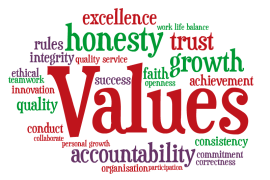When was the last time you considered what’s important to you / what you value?
Values are what drive your decisions and your behaviour.
Values affect how you choose your friends, what hobbies/interests you pursue, and may also affect which jobs/car you go for.
Values are important because you use them to evaluate yourself and others.
For example, if one of your values is honesty, you are more likely to hand in a wallet you find in the street to a local police station. You are also going to get a sense of satisfaction from doing so, which makes you feel good. Hence, you evaluate this action positively. On the other hand, if you see someone taking something that isn’t theirs, you will feel a sense of discomfort and evaluate their actions negatively.

Choosing activities that align with our values results in us feeling happier, more fulfilled and more comfortable in our own skin. If the activities we engage in don’t support our values, then we find ourselves in conflict. Many work-place relationship issues can be put down to conflicting values.
Organisations often promote their own values, although these aren’t always written down! An example here could be a workplace putting a value on people who work longer hours. This can promote inner conflict if you value a good work-life balance. Nothing’s necessarily written down, but people’s behaviour suggests it!
Within organisations, leaders will often lead their teams according to their own value systems. So if they are internally motivated and don’t require regular feedback on how well they are doing, their default position may be – they don’t see the value in providing feedback to their team members. For a team member who values, and is motivated by, regular feedback – he/she is likely to become unhappy, demotivated and perhaps disillusioned.
- How aware of our values are we?
- Do you know what your values are? … These can be different for different areas of your life, and there can be common ones too.
Working out your values
1. Divide your life up into areas. For example:
- work
- family
- friends
- hobbies/interests, etc.
2. For each area, list what is important to you. For example:
- companionship
- security
- honesty
- wealth
- trust
3. Examine the list(s) closely and ask yourself if there’s anything missing. Do you need to add something? For example:
- adventure
- success
- freedom
- fairness
4. Arrange your list in order of importance. Ask yourself, “Is ‘A’ more important than ‘B’?” Or “If I had to choose ‘B’ or ‘C’, which would be most important?”
Follow-up …
Score each item on the list as a percentage in terms of how well that value is being met. For example, if success is important to you in the workplace, how successful do you feel you are currently with your role/tasks? 100%? … 50%? … 75%?
Any area with a low score is worthy of the question:
“What needs to change to ensure this value is met?”











